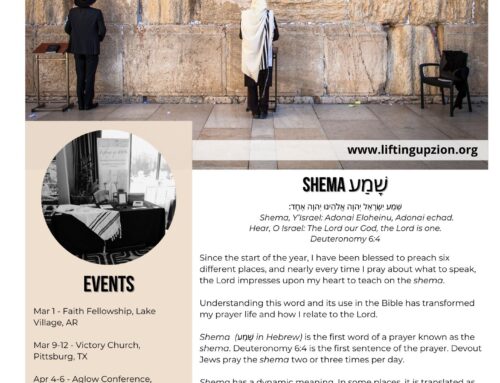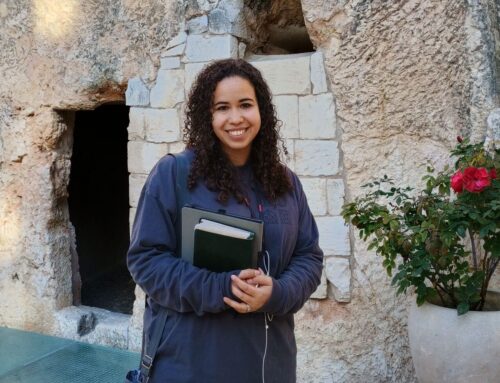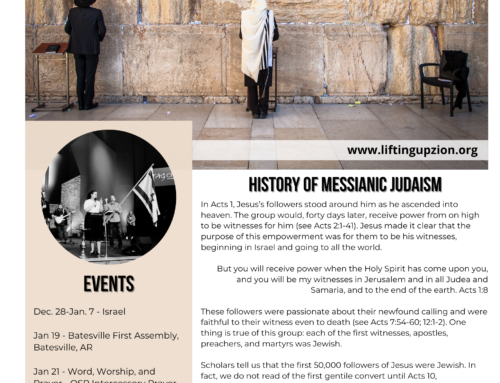During the times when the judges ruled Israel, a famine happened in Israel. A man named Elimelech took his wife, Naomi, and two sons and traveled to the land of Moab, a gentile land.
Elimelech died in Moab, leaving Naomi a widow. Naomi’s two sons, Mahlon and Chilion married Moabite wives: Orpah and Ruth. After about ten years, Mahlon and Chilion also died, leaving Naomi a widow and childless.
Naomi heard that the LORD had visited the people of Israel and given them food, so she decided to return home to Bethlehem, meaning in Hebrew, “house of bread.” She told her daughers-in-law to return to their families and sought out to leave, but one of them would not let Naomi go alone.
In what is probably the most compelling speech a gentile makes to a Jew in all of Scripture, Ruth refuses to leave her. She said:
“Do not urge me to leave you or to return from following you. For where you go I will go, and where you lodge I will lodge. Your people shall be my people, and your God my God. Where you die I will die, and there will I be buried. May the Lord do so to me and more also if anything but death parts me from you.” Ruth 1:16-17
Ruth clung to Naomi with such an intensity that Naomi could not resist her. Full of grief and despair; however, Naomi returned to Bethlehem with Ruth on her heels. After returning, she took on a new name: Mara, meaning bitter, saying that the Lord had dealt bitterly with her. She said: “I went away full, and the Lord has brought me back empty…” (Ruth 1:21).
Nevertheless, Naomi and Ruth returned to Bethlehem, and they came at an opportune time, “And they came to Bethlehem at the beginning of barley harvest” (Ruth 1:22). Because the women returned at the beginning of harvest, the details of the story move quickly. Ruth went out to glean in the harvest and happened upon the field of a man named Boaz, a relative of Naomi’s husband.
Boaz shows Ruth great favor, offers her protection, and provides abundantly, instructing the young men that work his field to leave extra food behind for her. Naomi perceived the favor shown to Ruth when she saw the bounty of harvest that she carried home.
At the end of the harvest time, when it is clear the provision is going to slow to a hault, Naomi comes up with an idea. She said to Ruth: “My daughter, should I not seek rest for you, that it may be well with you?” (Ruth 3:1). For the first time, Naomi calls Ruth, “My daughter,” And she develops a plan for Ruth to invite Boaz to be her kinsman redeemer, according to Israelite law.
Boaz was eager to become Ruth’s redeemer, but he had some work to do because there was another relative who, according to Israelite law, was first in line to redeem the inheritance of Naomi’s husband and sons. The other relative did not want to redeem her, saying: “I cannot redeem it for myself, lest I impair my own inheritance. Take my right of redemption yourself, for I cannot redeem it” (Ruth 4:6). The other redeemer perceived that it was to his disadvantage to take Ruth as a wife because the children would be raised in the name of Mahlon, Ruth’s deceased husband. Boaz gladly stepped in to redeem Naomi and become the husband of Ruth.
Boaz was not so concerned with making a name for himself. And on that point, the irony continues. Ruth bore a son, and Scripture says, “They named him Obed. He was the father of Jesse, the father of David” (Ruth 4:17). The irony is, Boaz redeemed Naomi and married Ruth fully aware that he would perpetuate the name of Mahlon. Yet, when we read in Matthew in the genealogy of Jesus, we read:
“and Salmon the father of Boaz by Rahab, and Boaz the father of Obed by Ruth, and Obed the father of Jesse, and Jesse the father of David the king” (Matt. 1:5-6).
Boaz is named in the genealogy of Jesus and so is Ruth. Because a gentile woman (Ruth) clung to a Jewish woman (Naomi) it sparked Boaz (who had a gentile mother, Rahab, and a Jewish father) to cling to Ruth.
The Lord in His sovereign plan put gentiles into the genealogy of Jesus showing us that when Jews and gentiles come together, amazing things happen.






